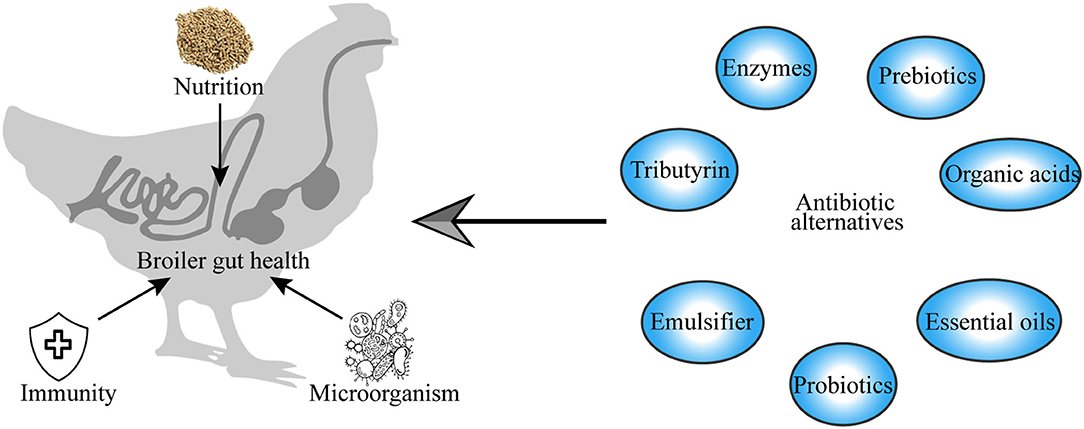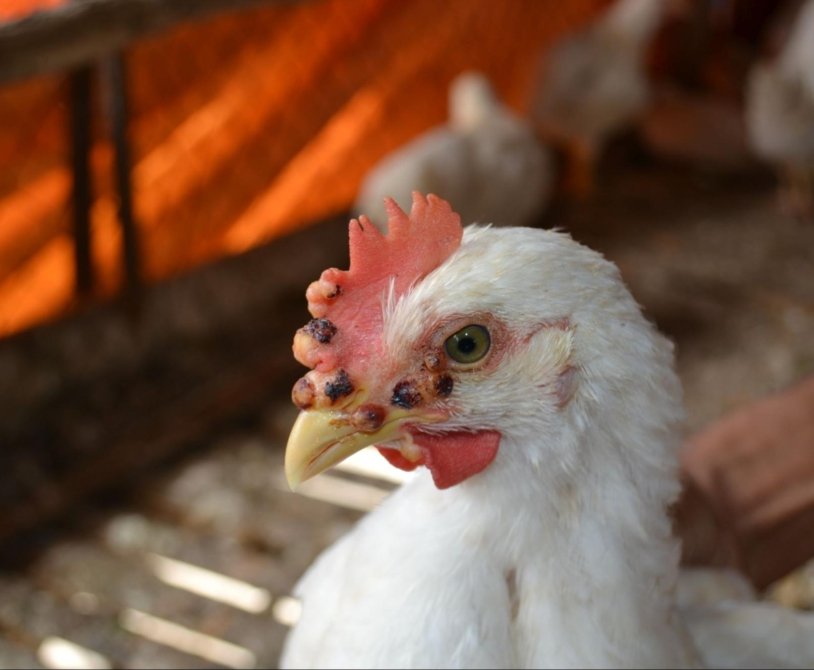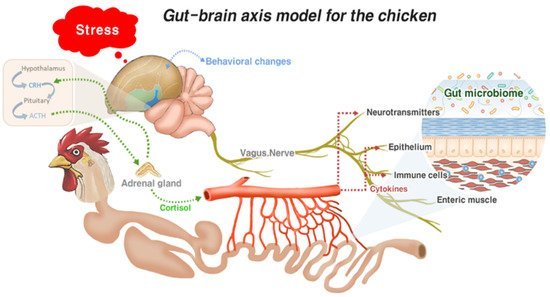Antibiotics have been key in poultry farming for a long time. But their overuse has made bacteria resistant to them. This is a big problem for both people and animals. So, many farmers are now moving to antibiotic-free methods.
This change is hard because keeping broilers healthy without antibiotics is tricky. Gut health is very important for broilers. It helps with their immune system, absorbing nutrients, and growing well.
To manage broiler chicken health without relying on antibiotics, we need to focus on gut health. We also need to boost their immunity and use natural broiler chicken health management practices. This article will show how farmers can do antibiotic-free poultry farming and keep their flocks healthy and strong.
Key Takeaways:
- The global trend towards reducing antibiotic use in poultry production is driven by consumer concerns about antibiotic resistance and human health.
- Maintaining gut health is crucial for organic broiler chicken husbandry and alternative therapies for broiler chickens without antibiotics.
- Gut health plays a vital role in broiler immunity, nutrient absorption, and overall performance.
- Proper nutrition, management practices, and targeted feed additives can help promote gut health and support How to Manage Broiler Chicken Health Without Relying on Antibiotics.
- A holistic approach is necessary to address the challenges of antibiotic-free poultry farming and ensure the success of sustainable broiler production.
Antibiotic Reduction: A Global Trend in Poultry Production
The poultry industry is moving away from antibiotics worldwide. This change is due to worries about antibiotic-resistant bacteria and their health risks. It also meets the growing need for “antibiotic-free poultry farming“.
Consumer Concerns about Antibiotic Resistance
People in rich countries are worried about antibiotics in animal farming. They fear the spread of antibiotic-resistant bacteria through food. This fear has made many want chicken and turkey without antibiotics.
Recent Regulations to Ensure Human Safety
Many countries have set new rules on antibiotics in poultry. These rules aim to protect public health and make farming more sustainable. Some places have banned antibiotics for growth, while others have cut down on important antibiotics.
| Country | Regulation on Antibiotic Use in Poultry |
|---|---|
| United States | Phasing out the use of medically important antibiotics for growth promotion in food-producing animals, and requiring veterinary oversight for the use of these antibiotics for disease treatment and prevention. |
| European Union | Banned the use of antibiotics as growth promoters in animal feed since 2006 and has implemented strict regulations on the use of antibiotics in food-producing animals. |
| China | Introduced regulations to reduce antibiotic use in livestock production, including banning the use of certain antibiotics as feed additives and requiring veterinary prescriptions for antibiotic use. |
These new rules, along with consumer pressure, are pushing the poultry industry towards antibiotic-free farming. Producers are now looking for new ways to keep birds healthy without antibiotics.
Challenges of Antibiotic-Free Broiler Production
The poultry industry is moving away from antibiotics. This change brings challenges for keeping broiler flocks healthy and performing well. One big issue is gut health maintenance without antibiotics. Antibiotics helped prevent and treat gut infections. Without them, the gut microbiome can become unbalanced, leading to poor nutrient absorption and increased disease risk.
Gut Health Maintenance
A healthy gut is key ftobroiler performance. It’s important for nutrient absorption, immune function, and overall health. Without antibiotics, producers must use other methods like special feed additives and better biosecurity. These help keep the gut microbiome balanced and prevent disease.
Poultry Immunity and Growth Performance
Removing antibiotics also affects poultry immunity and growth performance. Antibiotics helped with infections and promoted growth. Now, producers must find new ways to support immunity and growth without antibiotics.
To tackle these challenges, producers need a multi-strategy approach. They use tools like probiotics, prebiotics, and phytogenic feed additives. Staying up-to-date with research and best practices helps them manage antibiotic-free broiler production. This ensures the health and productivity of their flocks.
The Importance of Gut Health in Broilers
Gut health is key to chickens’ overall health. The gut is complex, vital for nutrient absorption and immune function. It’s home to many microorganisms, or the gut microbiome, which are crucial for the immune system.
The gut-associated lymphoid tissue (GALT) and gut-associated lymphocytes (GALs) fight off pathogens. The gut microbiome boosts the immune system and keeps the gut safe. A healthy gut microbiome is vital for broiler chickens’ immunity and growth.
The Gut: A Critical Immune Organ
The gut is a vital immune organ in poultry. It has GALT and GALs that fight off pathogens. These parts of the gut, as a critical immune organ in poultry, are essential for broiler chickens’ health.
The gut microbiome also boosts the immune system and keeps the gut safe. Keeping the gut microbiome healthy is crucial for broiler chickens’ immunity and growth.
“The gut microbiome plays a crucial role in the immune system, helping to stimulate the immune response and protect the gut from harmful microorganisms.”
The importance of gut health in broilers and the gut’s role as a critical immune organ in poultry are huge. By focusing on gut health, producers can improve broiler performance and overall flock well-being.
How to Manage Broiler Chicken Health Without Relying on Antibiotics
Managing broiler chicken health without antibiotics is a complex task. It involves promoting gut health, boosting immunity, and using sustainable practices. Broilers need high-quality feed and water. They also need a stress-free environment and strict biosecurity to prevent disease.
Using gut health-supporting feed additives is key. Probiotics, enzymes, prebiotics, organic acids, and phytobiotics help keep the gut healthy. They improve nutrient absorption, boost immunity, and stop harmful bacteria from growing.
Early disease detection and prevention are vital. This means monitoring closely and using treatments that strengthen the birds’ natural defenses. It’s a proactive way to keep the flock healthy without antibiotics.
| Strategies for Managing Broiler Health Without Antibiotics | Benefits |
|---|---|
| Maintaining Gut Health | Improved nutrient absorption, enhanced immune function, and inhibition of harmful bacteria |
| Boosting Immunity | Increased resistance to disease and better overall health |
| Implementing Sustainable Management Practices | Reduced stress, improved biosecurity, and prevention of disease outbreaks |
By focusing on holistic health management, poultry farmers can keep their flocks healthy without antibiotics. This approach benefits the animals and makes the poultry industry more sustainable and safe.
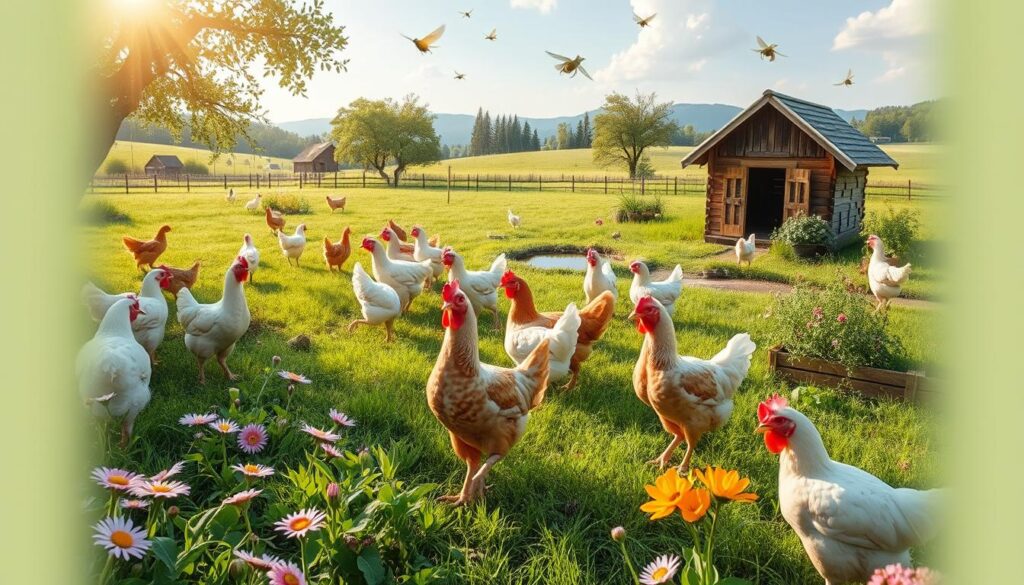
Dysbiosis and Its Impact on Broiler Performance
The gut microbiome is vital for broiler chicken health and performance. An imbalance, known as dysbiosis, can harm broiler production. It causes issues like wet litter, caking, pododermatitis, and hock-burn, affecting bird welfare and carcass quality.
Dysbiosis has a big economic impact. It leads to slower growth, worse feed conversion, and higher vet costs. It also makes diseases like coccidiosis worse, as harmful bacteria like Clostridium grow and produce toxins.
Keeping the gut microbiome healthy is key to avoiding dysbiosis and improving broiler performance without antibiotics. Factors like diet, water quality, environmental stress, and feed additives like probiotics and organic acids are important for gut health.
The early development of the chick microbiome is crucial for its future health. Starting with a healthy gut microbiome can help prevent dysbiosis and its effects on broiler performance.
Key Factors Affecting Broiler Gut Health
Keeping broiler chickens healthy is key, especially without antibiotics. Several factors can greatly affect their gut health. These include feed and water quality, managing stress, and exposure to microbes.
Feed and Water Quality
The quality of feed and water is vital for broiler gut health. With corn and soybean meal prices rising, managing feed quality is more important than ever. Also, providing clean, fresh water is crucial for their health.
Stress Management
Stress, like high temperatures or poor air, can harm the gut microbiome. With more birds raised without antibiotics, managing stress is critical. It helps keep their gut healthy and them performing well.
Microbial Exposure
Pathogens can upset the gut microbiome, causing health issues. It’s important to keep their immune system strong. Also, good sanitation and biosecurity are key to protecting their gut health without antibiotics.
By focusing on these areas, poultry farmers can improve gut health in broilers. This supports their growth and performance, even without antibiotics.
Promoting Gut Health Through Proper Nutrition and Management
In today’s world, keeping broiler gut health up is more important than ever. This is because we’re trying to use fewer antibiotics in raising poultry. The right diet and management are key to keeping gut health strong without antibiotics.
Broilers need to have clean water and good food. A balanced diet with proteins, energy, and vitamins helps their gut health. Keeping the broiler area clean, well-ventilated, and at the right temperature also helps prevent disease.
Spotting and treating gut problems early is crucial. Using gut health aids like probiotics and prebiotics helps keep the gut healthy. This way, the gut stays strong and diverse.
With a good nutrition and management plan, raising broilers without antibiotics can be profitable. This approach, along with watching for gut problems early, is essential. It’s the way to succeed in antibiotic-free poultry production.
Gut Health-Supporting Feed Additives
In the absence of antibiotics, using gut health-supporting feed additives is key. These additives include probiotics, enzymes, prebiotics, organic acids, and phytobiotics. They help keep broilers healthy and perform well without antibiotics.
Probiotics
Probiotics are live microbes that help balance gut bacteria. They are vital for broiler health and productivity.
Enzymes
Enzymes break down tough feed into nutrients that broilers can use better. This boosts their digestion and health.
Prebiotics
Prebiotics feed good bacteria in the gut, like Bifidobacteria and Lactobacilli. This improves the gut microbiome.
Organic Acids
Organic acids stop bad bacteria from growing in the gut. They help good bacteria thrive.
Phytobiotics
Phytobiotics come from plants and fight off infections. They keep the gut healthy and boost broiler performance.
Using these additives together helps keep broilers healthy and productive. This is especially important in systems without antibiotics.
| Feed Additive | Benefit |
|---|---|
| Probiotics | Improve intestinal microbial balance |
| Enzymes | Enhance nutrient utilization |
| Prebiotics | Promote growth of beneficial gut bacteria |
| Organic Acids | Inhibit the growth of harmful bacteria |
| Phytobiotics | Provide antimicrobial, anticoccidial, and immune-boosting properties |
“The strategic use of gut health-supporting feed additives is crucial for maintaining broiler performance and productivity in antibiotic-free production systems.”
The Seed, Feed, Weed Concept for Antibiotic Reduction
The poultry industry is working hard to cut down on antibiotic use. The Seed, Feed, Weed (SFW) concept is a new way to manage gut health. It focuses on three main steps to help chickens have a balanced gut, reducing the need for antibiotics.
The first step, “Seeding,” is about starting with good gut bacteria. This is done by adding probiotics to the birds. It helps build a strong gut, which is key to the birds’ health and defense against sickness.
The second step, “Feeding,” is about giving the right food and conditions. This means good feed and water, managing stress, and making sure the birds get the right microbes.
The last step, “Weeding,” uses special feed additives to get rid of bad bacteria. It helps keep the gut healthy and balanced, needing fewer antibiotics.
Using the SFW concept helps poultry farms deal with antibiotic-free challenges. Farms see better health, growth, and feed use. This approach has shown great results, making farms more productive and healthier.
The SFW concept is a key strategy for reducing antibiotics in poultry. It’s a holistic and sustainable solution for the industry. By using this method, farms can keep their birds healthy and productive without antibiotics.
“The Seed, Feed, Weed concept has been a game-changer in our antibiotic reduction efforts. By focusing on gut health, we’ve seen significant improvements in productivity and a reduction in the need for antibiotic interventions.”
– Dr. John Smith, Poultry Nutritionist at Toux Farm
Addressing Challenges Through a Holistic Approach
Overcoming antibiotic-free broiler production challenges needs a complete, holistic approach. This approach covers many aspects of broiler health and nutrition. By using different management practices and special feed additives together, producers can keep broilers healthy and performing well without antibiotics.
Health Status
Keeping broilers healthy is key, especially since antibiotics work best in low-health flocks. This can be done by following strict biosecurity, cleaning, and disinfection rules. Also, using all-in, all-out procedures helps a lot. High biosecurity standards can greatly lower antimicrobial resistance by stopping resistant genes from spreading.
Nutrient Digestibility
Improving how well nutrients are digested can help control bacterial growth. This can be done with enzymes and other additives that make nutrients easier to use and absorb.
Early Feed Intake
Getting broilers to eat early helps set up a good gut microbiome. This is vital for keeping them healthy and performing well without antibiotics.
Dietary Protein Management
Managing dietary protein levels and making them easier to digest can also fight bacterial growth. Bacteria need protein to grow. Using phytomolecules and other additives can help us use protein better and prevent bacterial overgrowth.
By focusing on these key areas with a mix of management practices and special feed additives, producers can beat the challenges of antibiotic-free production. They can keep broilers healthy and performing well.
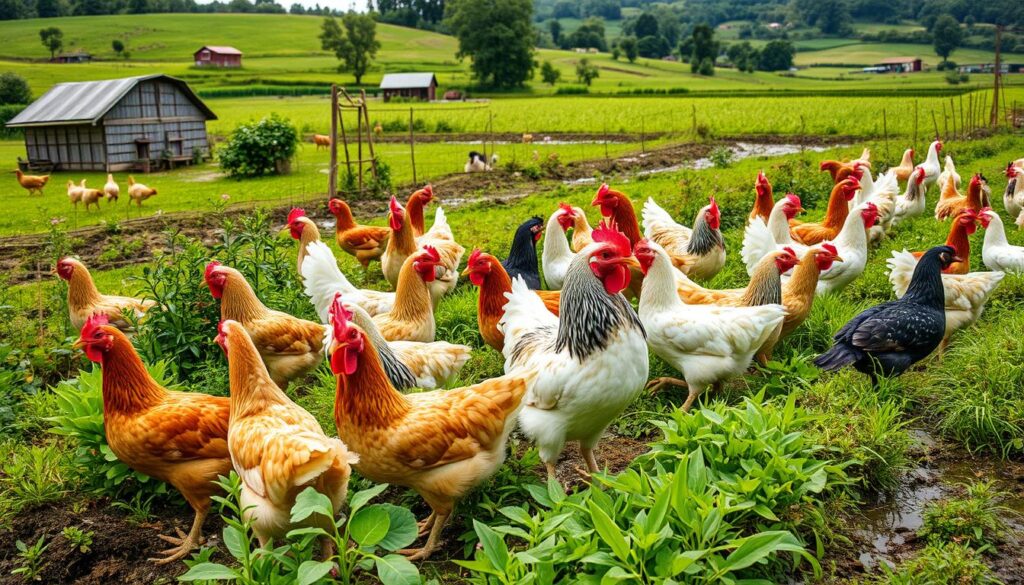
Switching to antibiotic-free broiler production is tough, but it’s happening worldwide. People are worried about antibiotic resistance and want safer food. Without antibiotics, keeping the gut healthy and supporting the birds’ immune systems is key.
A good plan includes the right food, careful management, and special feed additives. This way, producers can keep birds healthy without antibiotics. It’s all about creating a good environment for good bacteria and getting rid of the bad ones.
This approach, called “seed, feed, weed,” is crucial for safe, healthy chicken. It helps the poultry industry stay strong and meet consumer needs. By focusing on gut health and immunity, producers can overcome the hurdles of antibiotic-free farming.
FAQ
What are the main challenges of transitioning to antibiotic-free broiler production?
The main challenges include keeping the gut healthy, boosting immunity, and ensuring growth without antibiotics.
Why is gut health so important for broiler chickens?
Gut health is crucial for immune function, nutrient absorption, and overall health. A healthy gut microbiome is key to immunity and growth.
What are some strategies for managing broiler health without relying on antibiotics?
A multi-step approach is needed. This includes providing top-notch feed and water, keeping the environment stress-free, and strict biosecurity. Also, using gut health aids like probiotics and enzymes is important.
How can dysbiosis impact broiler performance?
Dysbiosis can cause problems like wet litter and hock-burn. It affects welfare and carcass quality. It also slows growth and increases vet costs.
What are the key factors that can impact broiler gut health?
Factors like feed and water quality, stress, and microbes can affect gut health. A strong immune system, cleanliness, and good management are vital for healthy guts without antibiotics.
How can the “Seed, Feed, Weed” concept help reduce antibiotic use in poultry production?
The Seed, Feed, Weed (SFW) concept promotes a healthy gut. It involves introducing good microbes, supporting their growth, and removing harmful ones. This approach supports health and productivity without antibiotics.


